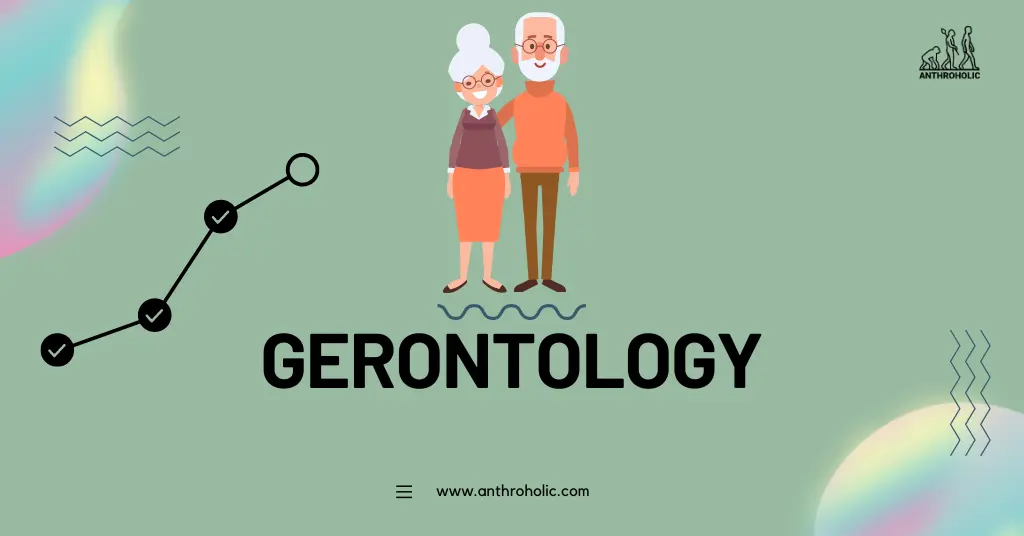AI Answer Evaluation Platform Live Now. Try Free Answer Evaluation Now
Gerontology
Gerontology is an interdisciplinary field of science that explores the physical, psychological, and socio-cultural aspects of aging. It’s a branch of study that’s increasingly relevant as the global population continues to age at an unprecedented rate, and it draws on the knowledge and methodologies from multiple disciplines such as biology, psychology, sociology, and healthcare.

Biological Aspects of Aging
Biogerontology, the study of the biological process of aging, seeks to understand the complex interplay of genetic, environmental, and lifestyle factors that influence our aging process.
Genetic Factors
- Telomeres: The ends of chromosomes, known as telomeres, shorten as cells divide, contributing to the aging process. Understanding telomere shortening helps us understand why our bodies age [1].
- Epigenetic Changes: Epigenetic alterations, changes that affect how genes are read by cells, also play a crucial role in aging [2].
- Mitochondrial Damage: Mitochondria, the energy-producing organelles in cells, accumulate damage over time, contributing to cellular aging [3].
Environmental and Lifestyle Factors
External factors like environmental exposures and lifestyle choices can accelerate or slow down the aging process. For instance, smoking, poor nutrition, and excessive sun exposure can all expedite aging.
Psychological Aspects of Aging
Psychogerontology, focusing on the psychological changes in aging, encompasses mental health issues, cognitive changes, and the psychological well-being of older adults.
Mental Health in Aging
Depression, anxiety, and dementia are common mental health concerns in older adults. It’s crucial to raise awareness about these issues and improve mental health services tailored to this age group [4].
Cognitive Aging
As we age, changes in cognitive function – such as memory, attention, and problem-solving abilities – are inevitable. Understanding these changes can help develop interventions to maintain cognitive health in later life [5].
Socio-cultural Aspects of Aging
Sociogerontology examines how societal and cultural aspects influence aging. This includes retirement, social isolation, ageism, and the role of seniors in society.
Ageism
Ageism is a prevalent issue, involving stereotypes, discrimination, and negative attitudes towards aging. Combatting ageism is essential to improve the quality of life of older adults [6].
The Role of Seniors in Society
As life expectancy increases, the roles of seniors in society are changing. They’re increasingly active in various domains, including volunteer work, lifelong learning, and even reentering the workforce.
Geriatric Healthcare
Geriatrics, a branch of medicine related to the treatment and care of older adults, overlaps with gerontology. Geriatricians focus on managing diseases and disabilities in older adults, emphasizing health maintenance and improving quality of life [7].
Conclusion
As our global population ages, gerontology’s importance continues to grow. It provides invaluable insights into aging’s biological, psychological, and socio-cultural aspects, contributing to the development of effective healthcare strategies for the aging population. Moreover, gerontology challenges us to rethink societal attitudes towards aging and the roles of older adults in our communities.
References
[1] Blackburn, E. H., & Epel, E. S. (2012). Telomeres and adversity: Too toxic to ignore. Nature, 490(7419), 169–171. https://doi.org/10.1038/nature11492 ↩
[2] Benayoun, B. A., Pollina, E. A., & Brunet, A. (2015). Epigenetic regulation of ageing: linking environmental inputs to genomic stability. Nature Reviews Molecular Cell Biology, 16(10), 593–610. https://doi.org/10.1038/nrm4048
[3] Sun, N., Youle, R. J., & Finkel, T. (2016). The Mitochondrial Basis of Aging. Molecular cell, 61(5), 654–666. https://doi.org/10.1016/j.molcel.2016.01.028
[4] World Health Organization. (2017). Mental health of older adults. https://www.who.int/news-room/fact-sheets/detail/mental-health-of-older-adults
[5] Harada, C. N., Natelson Love, M. C., & Triebel, K. (2013). Normal cognitive aging. Clinics in geriatric medicine, 29(4), 737–752. https://doi.org/10.1016/j.cger.2013.07.002
[6] Officer, A., & de la Fuente-Núñez, V. (2018). A global campaign to combat ageism. Bulletin of the World Health Organization, 96(4), 295–296. https://doi.org/10.2471/BLT.17.202424
[7] Reuben, D. B. (2017). Medical Care for the Final Years of Life: “When You’re 83, It’s Not Going to Be 20 Years”. JAMA, 318(24), 2424–2425. https://doi.org/10.1001/jama.2017.19138




